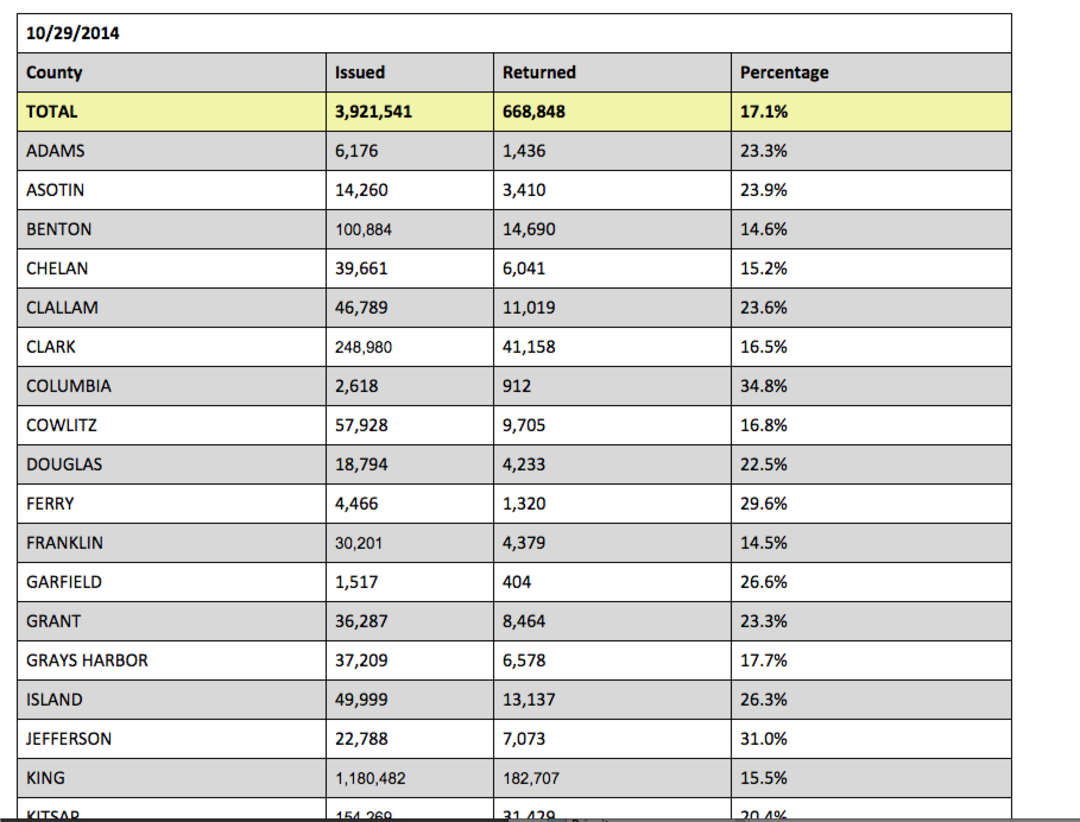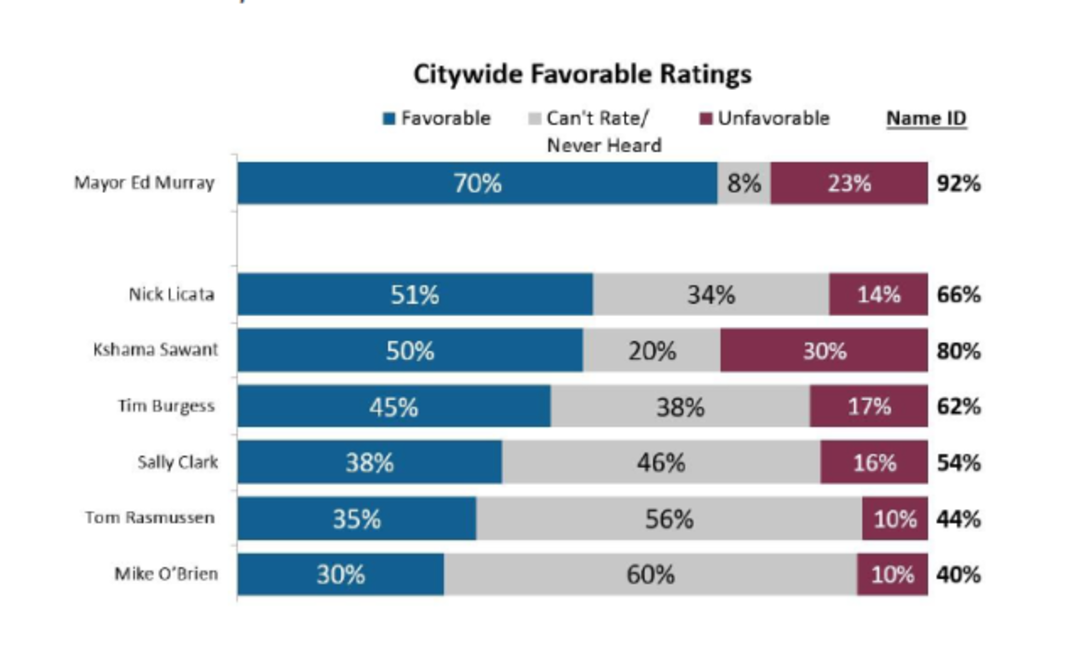Extra Fizz: Voter Turnout So Far; RIP Rep. Freeman; Burgess Definitely In; and AG Ferguson Exposed?
Some Afternoon Fizz:
1. The secretary of state reports that with a week to go before election day, there's been a 17 percent rate of return on ballots: 660,000 in so far, out of 3.9 million ballots mailed out two weeks ago. (King County is at 15.5 percent, with about 183,000 in so far out of nearly 1.2 million voters.)

Hard to say if those statewide numbers will ultimately translate into the 62 percent turnout the secretary of state originally predicted. As a recent Elway poll showed, voters aren't very engaged this year. And the fact that there's not a U.S. senate race in this off-year doesn't help turnout either.
Democrats are counting on a strong turnout so they can outperform their limp showing in the low-turnout August top-two primary in the pivotal state legislature contests where only one of their senate candidates (Matt Isenhower challenging Republican state Sen. Andy Hill in the 45th Microsoft suburbs) nudged past the make-or-break 45 percent.
Three of the nine council members—thirty three percent of the council—are landlords. They are: Bruce Harrell, Mike O'Brien, and Tom Rasmussen. Only five percent of the city are landlords.
P.s. Speaking of Hill. Yesterday, we challenged the GOP line that Hill has been a champion for ending corporate tax breaks. What we forgot to add to our assessment that he didn't get behind closing tax breaks, is this: He actually added corporate tax breaks to the budget.
2. And another follow-up to our "All-nine-members-of the-City-Council-are-Homeowners" story (subtext—including new socialist council member Kshama Sawant who bought a house in July): Three of the nine council members—thirty three percent of the council—are landlords. They are: Bruce Harrell, Mike O'Brien, and Tom Rasmussen. Only five percent of the city are landlords.
52 percent of the city are renters.
Also on that story: 1st District (West Seattle) candidate Amanda Kay Helmick tells us she, like all nine council members and all but two and a half of the candidates we've spoken with—is a homeowner. She reports that she lives in the Westwood neighborhood in West Seattle with her husband and son.
3. Cola rumor ... confirmed (from the source) ... Seattle City Council member Tim Burgess is running in the at-large position. A recent EMC poll showed Burgess with a 45 percent favorable rating citywide with 17 percent unfavorable; 38 percent never heard of him or didn't know.

Cola rumor. Longtime (since 1991) King County Council member Larry Phillips is not running for reelection. Message out. Phillips, a die-hard transit advocate and ST board member, represents north downtown Seattle scrolling northwest through Queen Anne, Magnolia—taking in Ballard and Wallingford—all the way up to Crown Hill and Bitter Lake.
4. Adding progressive cred to the city preschool measure, homeless paper Real Change endorsed Prop 1B, the city's pre-k funding measure, over the competing Prop 1A, an unfunded union measure that requires preschool training and expediated pay raises for childcare workers.
PubliCola also picked Prop 1B over Prop 1A.
5. State Rep. Roger Freeman (D-30, Federal Way) died today. He was diagnosed with cancer last year. Freeman was just one of two black members in state legislature.
Freeman was in a tight race against Republican Jack Dovey in an election season where the Democratic house isn't as secure as some may think.
6. File this one under On Other Blogs Today: The New York Times has a must-read investigative piece on the role of money and lobbying on state attorneys general. Campaign contributions, undue access, and wining-and-dining influence are givens in legislative and executive offices. But as the lengthy NYT expose makes clear, corporate influence is also a formidable force in the ostensibly genteel, legal world of AGs.
A couple of main characters in the NYT expose: A) Former Republican Washington state AG Rob McKenna (now a corporate lobbyist) using his bonafides to get results on behalf of T-Mobile and Microsoft from the current Democratic Washington state AG Bob Ferguson. And B) Ferguson too, in a damning passage from the NYT piece, squeezing money from an energy drink company in what looks like a quid pro quo to get the Washington state AG's office to drop out of a 33-state investigation into allegations of deceptive advertising.
The NYT writes:
Executives from the company that distributes 5-Hour Energy, for example, have contributed more than $280,000 through related corporate entities in the last two years to political funds of attorneys general.
Company executives wrote those checks after the investigation into false claims and deceptive marketing, which initially involved 33 states, opened in January 2013. Requests started to come in for contributions, including a phone call this year directly from Mr. Ferguson of Washington State, whose staff was involved in the inquiry.
In a statement after the company was sued by three states in July, the company strongly denied the allegations and compared being solicited for contributions to being pressured to pay “ransom.” It asked, “Is it appropriate for an attorney general to ask for money from a company they plan to sue?”
A spokesman for Mr. Ferguson first called the allegation baseless. But after being shown a copy of an invitation to a fund-raising event that Mr. Ferguson held in May during a DAGA conference — where 5-Hour Energy was listed as a sponsor — his spokesman confirmed that Mr. Ferguson had made a personal appeal to the company.
In another damning excerpt from the article, the NYT catches Ferguson doing T-Mobile's bidding on behalf of T-Moblie lobbyist McKenna.
In Washington State, both Mr. McKenna, the former attorney general, and Mr. Moran, who had been his top deputy, were pressing their former colleagues within months of leaving their jobs last year, on behalf of clients including Microsoft and T-Mobile, emails show.
For Mr. McKenna, it was quite a turnaround. He had sued T-Mobile in September 2011 to block its proposed merger with AT&T. Now, as a corporate lawyer, Mr. McKenna was setting up meetings with his successor, Mr. Ferguson, to ask him to intervene with federal officials on T-Mobile’s behalf in the inquiry over whether the company was seeking to prevent its competitors from acquiring what it thought was too large a share of the available federal wireless spectrum.
“I write today on behalf of the millions of consumers of wireless and mobile computing services,” said a letter, drafted initially by T-Mobile, but sent out by Mr. Ferguson in January, although it made no mention of the role played by the company or the former attorney general.


